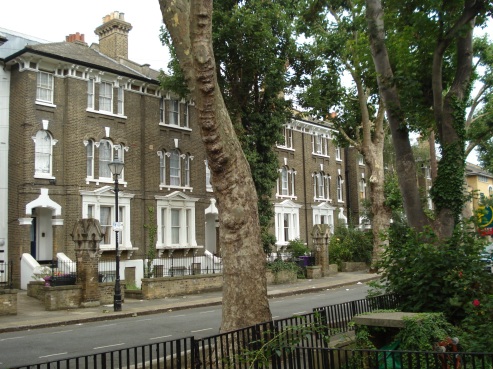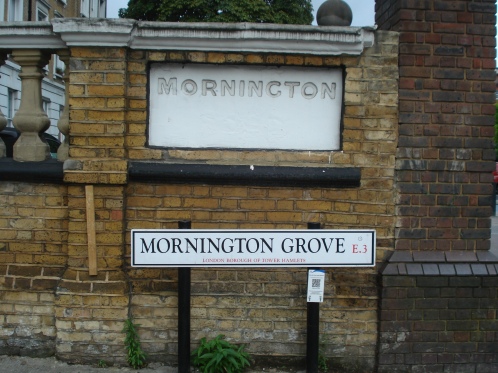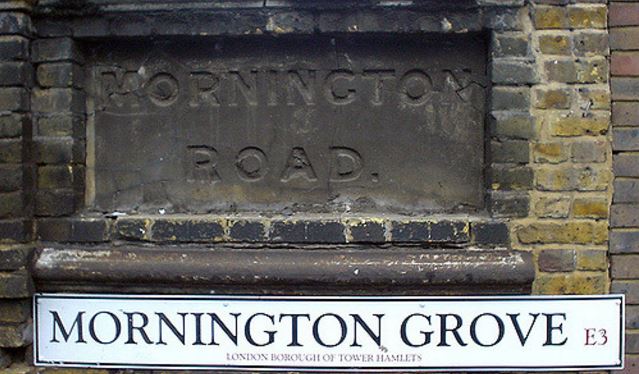“Unusually Grand“
Mornington Grove in Bow is a cul-de-sac situated just east of Bow Road District Line Underground Station, on the south side of Bow Road. Pevsner, in The Buildings of England, describes Mornington Grove: On the west side tall pairs of houses c.1860; they seem unusually grand for the area. Three storeys, eclectic detail: bracketed eaves and tripartite windows which are pedimented on the ground floor, arched on the first floor. [Pevsner The Buildings of England – London 5: East p.619. Cherry, O’Brien & Pevsner, Yale University Press 2005]

I decided I would like to research and write a booklet about the history of this street, how it came into being, why it is as it is, and what it became over the years. Rather than wait until the booklet is finished – which may be quite a while – I thought I could publish such stuff as I discover on this website.
The name was changed to Mornington Grove in 1939. The photograph in the header above shows the two street names, Mornington Road and Mornington Grove, and was taken by ‘Diamond Geezer’ in his collection of Street Signs Along Bow Road, Summer 2006 (also published on his blog). But in recent years the historic name has been expunged altogether – this photo was taken in July 2017:

Summary
The land between Mile End and Bow was, in the 18th and early 19th century, primarily arable and market gardening land, but that upon which Mornington Grove is built was part of Mile End Nursery, famous for importing and cultivating exotic plants. A 3¾ acre portion of the nursery’s land was bought by The Religious Society of Friends, Quakers, (their Ratcliff Monthly Meeting) in September 1812. The main events in the history of Mornington Grove are its laying-out, the later first appearance as Mornington Road and the building of the 20 “unusually grand” houses on the west side, 1854-c.1861; the development of the east side, including a large Presbyterian church on the corner with Bow Road and the building of three joined terraces, 28 additional houses, that were completed by 1889. The owners of the land, the Quakers, stipulated that at least five sevenths of the income from the estate must go to the support of the Poor. In 1897-1902 over a third of the houses in the street were demolished following their compulsory purchase for the building of the Whitechapel and Bow Railway (to become The District Line); the name was changed to Mornington Grove in 1939 and then further destruction was wrought by bombs in the Blitz, 1940 during World War II. In the early 20th century the wealthy middle class tenants were replaced by the less wealthy, and the big houses now subject to multiple occupancy. The Quaker owners of the street sold nearly all of it to Springboard Housing Association in 1980 and it became ‘social housing’. In 1990 the site that had been that of the Presbyterian church was taken over by the building of Thames County Court and Probation Service. Springboard HA was subsumed into Genesis Housing Association, and in 2009 Genesis HA began to sell the flats that became empty into private ownership. In 2018 Genesis HA merged with Notting Hill Housing to become Notting Hill Genesis.
Increasingly detailed history
The development of the buildings on the land, what sort of buildings they were, and what happened to those buildings is an interesting story; similarly, the ownership of the land and buildings and how that changed has implications even to the present day; the people who populated the street and the events that took place give an intriguing picture of how life in this part of London was lived and how it has changed. As this website develops, it will provide a place where an increasingly detailed picture of the history of Mornington Grove is presented.
All information about Mornington Grove in the past is welcome. Please contact me, Ken Ward, 23 Mornington Grove, E3 4NS, or by email: kenunderground at gmail dot com
I have travelled far, I have travelled wide:
I have been to Penge, and to Barkingside,
But wherever I walked and wherever I drove
I found no place better than Mornington Grove.
There are riches to find in foreign parts
I have found them in Romford, and even in Herts,
But the greatest of all, the true treasure trove
Is found here at home, in Mornington Grove.
We may wander for years, through the day and the night,
Seeking joy in darkness and truth in the light,
But from dawn till evening in vain shall we rove
Till we find our way home to Mornington Grove.
